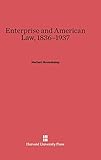Enterprise and American Law, 1836–1937 / Herbert Hovenkamp.
Material type: TextPublisher: Cambridge, MA : Harvard University Press, [2013]Copyright date: ©1991Edition: Reprint 2014Description: 1 online resource (443 p.) : 1 mapContent type:
TextPublisher: Cambridge, MA : Harvard University Press, [2013]Copyright date: ©1991Edition: Reprint 2014Description: 1 online resource (443 p.) : 1 mapContent type: - 9780674335561
- 9780674335585
- Antitrust law
- Antitrustrecht
- Bedrijfsleven
- Corporation law
- Gesellschaftsrecht
- Industrial policy
- Recht
- Trade regulation
- Wetgeving
- Wirtschaftsrecht
- Antitrust law -- United States -- History
- Corporation law -- United States -- History
- Industrial policy -- United States -- History
- Trade regulation -- United States -- History
- LAW / General
- 343.73/08/09
- KF1414
- online - DeGruyter
| Item type | Current library | Call number | URL | Status | Notes | Barcode | |
|---|---|---|---|---|---|---|---|
 eBook
eBook
|
Biblioteca "Angelicum" Pont. Univ. S.Tommaso d'Aquino Nuvola online | online - DeGruyter (Browse shelf(Opens below)) | Online access | Not for loan (Accesso limitato) | Accesso per gli utenti autorizzati / Access for authorized users | (dgr)9780674335585 |
Browsing Biblioteca "Angelicum" Pont. Univ. S.Tommaso d'Aquino shelves, Shelving location: Nuvola online Close shelf browser (Hides shelf browser)

|

|

|

|

|

|

|
||
| online - DeGruyter Milton and Science / | online - DeGruyter Theory of the Democratic State / | online - DeGruyter Political Control of Literature in the USSR, 1946–1959 / | online - DeGruyter Enterprise and American Law, 1836–1937 / | online - DeGruyter Red Flag in Japan : International Communism in Action, 1931–1951 / | online - DeGruyter Opera : The Art of Dying / | online - DeGruyter Labor Politics American Style : The California State Federation of Labor / |
Frontmatter -- Contents -- Preface -- Introduction: Classicism, Democracy, and the Rule of Law -- PART I. THE CLASSICAL CORPORATION AND STATE POLICY -- CHAPTER 1. Classical Political Economy and the Business Corporation -- CHAPTER 2. Vested Corporate Rights -- CHAPTER 3. Politics and Public Goods -- CHAPTER 4. The Corporate Personality -- CHAPTER 5. Limited Liability -- CHAPTER 6. Corporate Power and Its Abuse -- PART II. THE ECONOMIC CONSTITUTION -- CHAPTER 7. A Moral Theory of Political Economy -- CHAPTER 8. The Classical Theory of Federalism -- CHAPTER 9. An Economic Interpretation of the Constitution -- PART III. THE RISE OF REGULATED INDUSTRY -- CHAPTER 10. Market Failure and Constitutional Classicism: The Slaughter-House Cases -- CHAPTER 11. Regulation and Incorporation -- CHAPTER 12. The Railroads and the Development of Regulatory Policy -- CHAPTER 13. Federalism and Rate Discrimination -- PART IV. THE POLITICAL ECONOMY OF SUBSTANTIVE DUE PROCESS -- CHAPTER 14. Historical Explanation and Substantive Due Process -- CHAPTER 15. The American School of Political Economy -- CHAPTER 16. The Wages Fund -- CHAPTER 17. Market Failure and the Constitution -- PART V. THE LABOR COMBINATION IN AMERICAN LAW -- CHAPTER 18. Classical Theory and the Labor Cartel -- CHAPTER 19. Coercion and Its Meaning: Antitrust and the Labor Injunction -- PART VI. THE ANTITRUST MOVEMENT AND THE THEORY OF THE FIRM -- CHAPTER 20. American Merger Policy and the Failure of Corporate Law -- CHAPTER 21. The Classical Theory of Competition -- CHAPTER 22. The Rise of Industrial Organization -- CHAPTER 23. The Fixed-Cost Controversy -- CHAPTER 24. Potential Competition -- CHAPTER 25. Vertical Integration and Resale Price Maintenance -- Epilogue: Classical Enterprise in Decline -- Notes -- Index
restricted access online access with authorization star
http://purl.org/coar/access_right/c_16ec
In this integration of law and economic ideas, Herbert Hovenkamp charts the evolution of the legal framework that regulated American business enterprise from the time of Andrew Jackson through the first New Deal. He reveals the interdependent relationship between economic theory and law that existed in these decades of headlong growth and examines how this relationship shaped both the modern business corporation and substantive due process. Classical economic theory--the cluster of ideas about free markets--became the guiding model for the structure and function of both private and public law. Hovenkamp explores the relationship of classical economic ideas to law in six broad areas related to enterprise in the nineteenth and early twentieth centuries. He traces the development of the early business corporation and maps the rise of regulated industry from the first charterbased utilities to the railroads. He argues that free market political economy provided the intellectual background for constitutional theory and helped define the limits of state and federal regulation of business behavior. The book also illustrates the unique American perspective on political economy reflected in the famous doctrine of substantive due process. Finally, Hovenkamp demonstrates the influence of economic theory on labor law and gives us a reexamination of the antitrust movement, the most explicit intersection of law and economics before the New Deal. Legal, economic, and intellectual historians and political scientists will welcome these trenchant insights on an influential period in American constitutional and corporate history.
Mode of access: Internet via World Wide Web.
In English.
Description based on online resource; title from PDF title page (publisher's Web site, viewed 29. Nov 2021)


